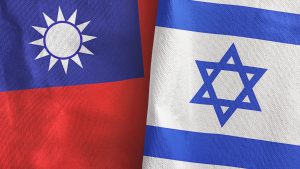Trans-Pacific View author Mercy Kuo regularly engages subject-matter experts, policy practitioners, and strategic thinkers across the globe for their diverse insights into U.S. Asia policy. This conversation with Dr. Mor Sobol – associate professor in the Department of Diplomacy and International Relations at Tamkang University, Taiwan and contributing author to “Israel-Asia Relations in the Twenty-First Century: The Search for Partners in a Changing World” (2024) – is the 432nd in “The Trans-Pacific View Insight Series.”
Identify the core values and objectives of Israel-Taiwan relations.
Initially, the core values guiding Israel-Taiwan relations can be seen as rooted in universal principles such as democracy, freedom, the rule of law, and human rights. While these values are indeed important – especially given the current challenges to the liberal international order posed by actors like China and Russia and the emerging like-minded alliance of like-minded countries – it is important to recognize that both countries [Israel and Taiwan] primarily pursue their national interests based on practical considerations.
In the case of Israel and Taiwan, both countries face significant security threats from neighboring powers, heavily rely on the American political and security umbrella, and operate within a complex geopolitical environment. As such, they must continually find ways to defend and strengthen their internal and external positions.
For instance, both countries boast advanced, export-oriented economies. However, their strengths differ: Taiwan excels in engineering and manufacturing, while Israel is a global leader in innovation and entrepreneurship. Consequently, a key objective for Jerusalem and Taipei is to identify specific policy areas – such as agriculture, healthcare, and cybersecurity – where they can collaborate and complement one another. In doing so, they must navigate the complexities of cross-strait tensions and the broader U.S.-China geopolitical competition.
Examine the evolution of the Taiwan government’s approach toward Israel.
Basically, we could divide the development of Taiwan-Israel relations into four time periods.
The “security-first” period (1950s-1980s): During this time, Taiwan had no formal relations with Israel due to Israel’s recognition of the People’s Republic of China (PRC) in 1950. Still, Taiwan sought Israel’s support in providing an additional security layer to the American security umbrella vis-a-vis Beijing.
The “transition” period (1993-2007): Israel and Taiwan established representative offices in the early 1990s, marking the beginning of (in)formal ties. While navigating the constraints of Israel’s “One China” policy, both countries began exploring economic, technological, educational, and cultural cooperation.
The “honeymoon” period (2008-2015): Relations flourished during that period, and both countries felt more at ease continuing and institutionalizing their relationship. These developments not only originated from the relationship already having good foundations but also since the ties between Taipei and Beijing significantly improved under KMT’s president, Ma Ying-jeou.
Last, the “it’s complicated” period (2016-present): This era is marked by the increasing challenge of stabilizing the U.S.-China-Taiwan-Israel quadrilateral dynamics amidst growing Taiwan Strait and U.S.-China rivalry tensions. However, these challenges also present opportunities for further cooperation in new areas (like civil defense).
Analyze Israel-Taiwan relations vis-à-vis U.S.-China geopolitical competition.
The U.S.-China geopolitical competition has always significantly impacted Israel-Taiwan relations. In the 1970s, when the American administration decided to get closer to Beijing while unofficially remaining committed to the security of Taiwan, Israel stepped in (with the support of the U.S.) as a key arms supplier. In the 1990s and early 2000s, the U.S. and Taiwan were frustrated with Israel’s arms sales to China, fearing it would undermine U.S. superiority in the Taiwan Strait (e.g., the Phalcon and Harpy incidents).
In recent years, the growing U.S.-China rivalry has placed Israel in a delicate position. Israel finds it challenging to balance relations with its most important ally, the United States, and China, a key trading partner. The fact that Taiwan has become more active in reaching out to Israel and expressing the dangers of cooperation with China did not make it any easier for Israel and the Foreign Affairs Ministry to expand its cooperation with Taipei while juggling between Washington and Beijing.
Finally, following Hamas’ terror attack on October 7, 2023, Beijing decided to take a rather anti-Israel (or even antisemitic) stance as it has been trying to capitalize on the Israel-Hamas war to strengthen its position in the Global South in general and the Middle East in particular. This shift may prompt Israeli circles to advocate for closer ties with Taiwan as a like-minded ally, even at the risk of straining relations with Beijing.
Explain the impact of the Israel-Hamas war on Taiwan’s political elite and public.
Generally speaking, Taiwan’s public shows limited interest in the geopolitics of the Middle East or the Israel-Palestinian conflict. However, like the Russia-Ukraine war, the Israel-Hamas war has served as a wake-up call for Taiwan, emphasizing the need to be prepared for sudden escalations. While public engagement with the conflict has been low compared to the U.S. and Europe, the reaction within political and security circles has been much more substantial.
Since October 7, the Taiwanese government has shown unwavering support for Israel, with political statements from senior officials and actions by the Ministry of Foreign Affairs and Taiwan’s representative to Israel, Abby Ya-ping Lee. Taiwan’s security establishment has also expressed great interest in learning from Israel’s experience in areas such as reserve training, missile defense, intelligence gathering, UAVs, and civil resilience.
Assess the geopolitical challenges and opportunities of Israel-Taiwan cooperation.
Looking ahead, Israel-Taiwan relations are likely to follow their current trajectory. Trade will continue to grow, and education, culture, and technology cooperation will expand. Still, Israel will likely remain cautious in its dealings with Taiwan to avoid aggravating China. That said, if U.S. pressure on Israel to reduce engagement with China increases and if China continues its hostile approach toward Israel to gain favor in the Global South and the Muslim world, Israel may reconsider its position.
While Israel is unlikely to shift its diplomatic recognition from China to Taiwan, it might become more open to broader cooperation with Taiwan, including in sensitive areas such as security and defense.

































